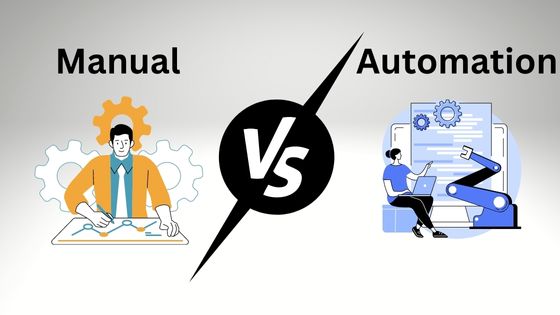In the software development life cycle, testing plays a crucial role in ensuring the quality and functionality of an application. Software testing can be broadly classified into two categories: manual testing and automation testing. While manual testing involves a tester manually executing test cases, automation testing leverages automation tools to execute test cases automatically. In this article, we will compare automation testing vs manual testing, and explore their benefits and limitations in the context of enterprise application testing.


Manual Testing: The Pros and Cons
Manual testing involves a tester manually executing test cases to identify defects or errors in an application. Manual testing requires human intuition and creativity to identify potential problems that might go unnoticed by an automated tool. It is especially useful in exploratory testing, where testers can explore different scenarios and validate the functionality of an application.
One of the major drawbacks of manual testing is its time-consuming nature, as it requires testers to manually execute test cases and log defects. Also, manual testing is prone to human errors, which might result in missing defects or reporting false positives. Manual testing also poses scalability challenges, as it is not feasible to manually test applications with a large number of test cases and configurations.
Automation Testing: The Pros and Cons
Automation testing involves using automated tools to execute test cases automatically, without human intervention. Automation testing is faster, more reliable, and more scalable than manual testing. It is especially useful in regression testing, where testers need to execute a large number of test cases repeatedly to ensure that the application does not break due to code changes.
One of the major advantages of automation testing is its speed and efficiency, as it allows testers to execute a large number of test cases in a shorter time frame. Automation testing also reduces the risk of human errors, which might occur during manual testing. However, automation testing requires significant upfront investment in automation tools and infrastructure, which might be a barrier for small or medium-sized businesses.
Automation vs Manual Testing: Which Is Right for Your Enterprise Application Testing?
Enterprise applications are complex and require thorough testing to ensure their quality and functionality. The choice between automation vs manual testing depends on various factors such as application complexity, test coverage, time-to-market, and budget.
For simple applications with a limited number of test cases, manual testing might be sufficient. However, for complex applications with a large number of test cases and configurations, automation testing is recommended. Automation testing can help businesses save time and reduce costs by automating repetitive tasks and enabling faster feedback loops.
Enter Opkey: The All-In-One Automation Testing Solution
Opkey is an all-in-one automation testing platform that helps businesses automate their testing efforts and accelerate their time-to-market. With Opkey, businesses can create and execute test cases across web, mobile, and desktop applications, and integrate with popular testing frameworks like Selenium and Appium.
Opkey offers a wide range of features that simplify automation testing, such as a visual test case builder, test data management, test case versioning, and test result analytics. Opkey’s AI-powered self-healing mechanism also automatically fixes test scripts that fail due to minor UI changes, reducing the maintenance effort required for automation testing.
Conclusion
Automation vs manual testing is a crucial decision for businesses looking for enterprise applications testing. While manual testing is useful for exploratory testing, automation testing is recommended for complex applications with a large number of test cases and configurations. Opkey is an all-in-one automation testing solution that simplifies automation testing and helps businesses accelerate their time-to-market.

























